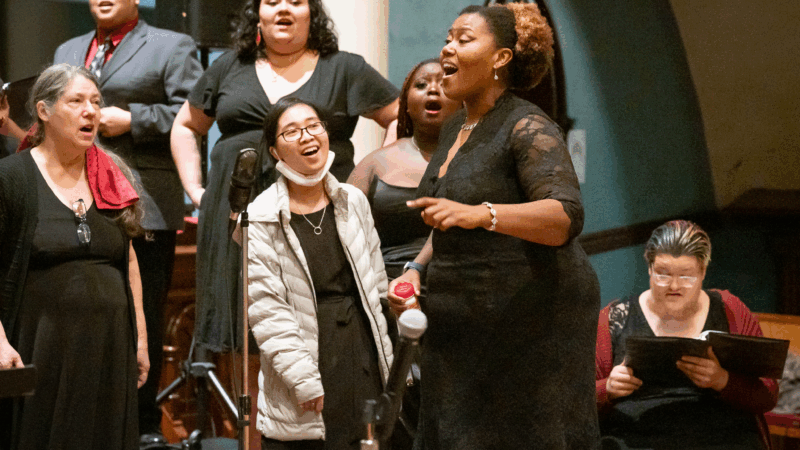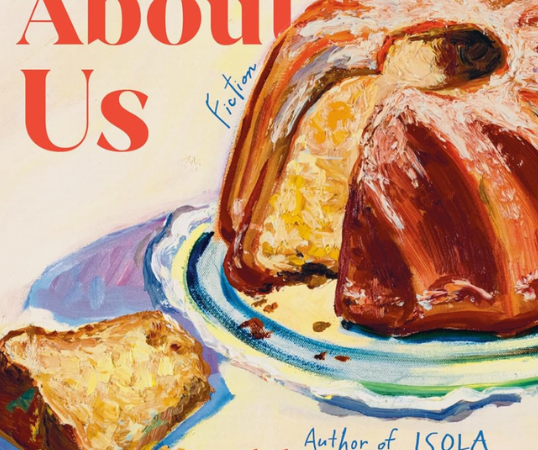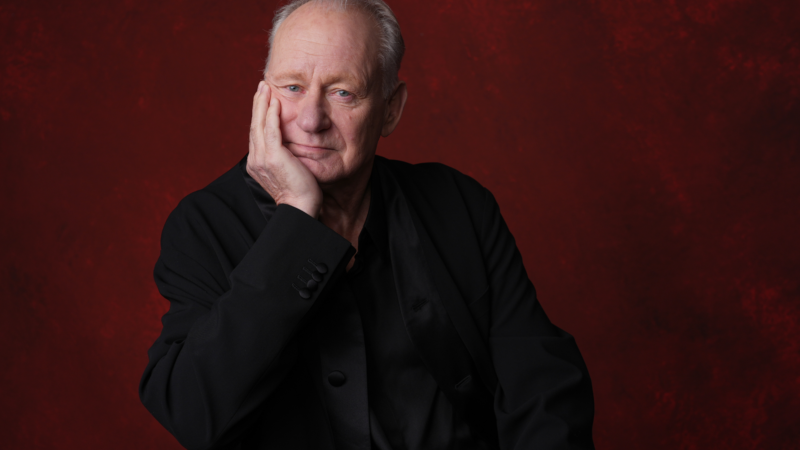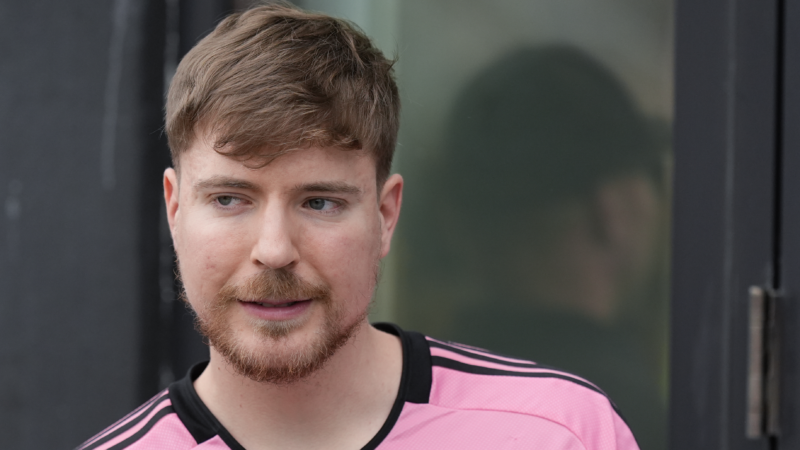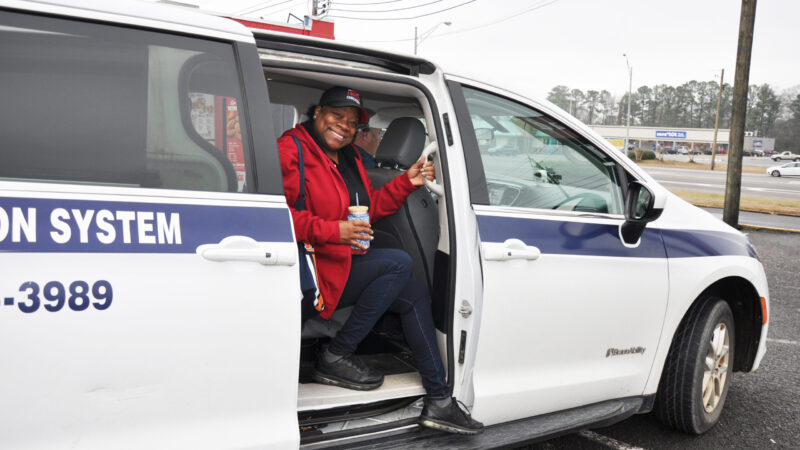In order to have conversations — start by singing
As a young child in New Orleans, Coty Raven Morris didn’t make a distinction between learning music and learning anything else.
“The things that I learned about history, about my culture, about other people’s cultures, I learned in song and play,” she says.
“There were not specific music classes when I was in New Orleans,” she says. “Everything was sung.”
“When people sing together, you can see them removing the mask of insecurity.”
As an adult, she studied choral conducting and music theory, but she was still thinking about how to live through music, rather than relegate it to a sidebar of life. At one point she found herself at a workshop about equity, which she found “exhausting and boring,” and “divorced from the people that it’s talking about.”
“ It kind of seemed like 45 minutes of making people feel guilty,” says Morris. “The room was made up of predominantly white people who showed up intentionally to learn. And I think guilt just paralyzes them from conversations.”
When she voiced her complaints to a mentor, the mentor turned the question back to her – what would she do to foster equity?
“ I would just help people facilitate conversations,” she said. “Put different people in the same room and have them actually articulate, ‘Hi, this is my name. These are my pronouns. I’m from this place. This is my ethnicity. This is my race,’ and incorporate that into a conversation at the forefront of building rapport and community.”
Not, she said “as a topic that comes up when the world is on fire.”
That conversation would lead her to developing her own musical philosophy and curriculum – one that guides her work today – bringing people together to perform music as an act of social justice.
“When people sing together, you can see them removing the mask of insecurity,” says Morris.
Teaching the community to sing
Now a professor of choir and music education at Portland State University, Morris has twice been nominated for a Grammy award in Music Education, in part for her work organizing singing events.
A few times a year, different local choruses and members of the public gather in something she calls a community sing. Some have been performing together for years, some have no experience whatsoever.
People frequently tell her they can’t sing. “I say, ‘First of all, you haven’t had me as a teacher yet,’ ” says Morris.
“Second of all, someone told you you can’t sing. Someone took away one of the most healing things in your body.”
I’m sorry they said that to you, she tells them. “Now it’s time to get to work.”
“ I heard Professor Morris talk and said, ‘I’m going to go back to school to be a choir teacher.’ “
On the night of a recent community sing, several hundred people gathered in a church in downtown Portland. Apollo Fernweh was there leading the Blueprint Ensemble Arts Youth Choir. He earned a degree in German but hearing Morris talk four years ago changed the entire trajectory of his life.
“I said, ‘I’m going to go back to school to be a choir teacher. Because that person is awesome and I want to learn from them,'” he remembers.
The night at the community sing was Fernweh’s first time conducting with a crowd that large, and when he took the stage, he quickly directed the youth choir and the crowd to sing a song in two parts.
Ethan Sperry was also there that night. He runs the choral program at Portland State and actually hired Morris. That decision, he says, is “maybe the best thing that’s ever happened to me professionally.”
After he got funding approved for a music education position, says Sperry, he called more than 70 people looking for the right one. “I knew after our first conversation,” he said of Morris. “That’s who I want to hire.”
The job, he said, is to lead music education at Portland State, as well as to expand the program “so that our students be better prepared to use choir to build community in underprivileged areas.”
Sperry says other models of homeless choirs and inner city choirs – that have helped people in marginalized demographics – inspired him to pursue this project to build their own community through music.
That community, he says, starts at Portland State University, where he has observed choir members listen and empathize with each other.
“The graduation rate of choir students is vastly higher than the overall population,” he says.
“We’re a mixed bag”
Retired biology teacher Rich Hanson says music for him was the path not taken. He sang in church and school choirs, but he felt that science would be a more practical choice that would lead to a stable income.
“I kind of regret it,” says Hanson.
Now he likes to come to the events to sing, and to watch his granddaughter sing in the youth choir. He chuckled, “we’re a mixed bag here, which is awesome.” Looking around at the audience he remarked, “we have a wonderful tapestry of the human race.”
Toward the end of the concert, dozens of people on the stage sang a song called “We Are One.” The singers included college kids with blue hair, a mom and daughter from Eritrea, and a woman with a walker and an oxygen tank.
She was one of the most enthusiastic singers.
“When we laugh, when we sing, when we cry,” say the lyrics, “we are one.”
Surgeon general nominee Means questioned about vaccines, birth control and financial conflicts
During a confirmation hearing, senators asked Dr. Casey Means about her current positions and her past statements on a range of public health issues.
This novel about family drama is so good you may want to re-read it immediately
Allegra Goodman's new novel is called This Is Not About Us, but critic Maureen Corrigan says that title is coy: Readers are bound to see aspects of themselves and their families in these pages.
Actor Stellan Skarsgård doesn’t believe in bad guys
Skarsgård plays a filmmaker struggling to connect with his two grown daughters in Sentimental Value. As the father of eight, the Swedish actor says he understands the tension his character faces.
Kalshi reveals insider trading case against editor for MrBeast
With prediction markets booming, so have concerns about insider trading. Now, Kalshi has disclosed its first public actions against accounts suspected of trading on confidential information.
Greetings from Jordan’s Wadi Rum desert, where patches of green emerge after winter rains
Wadi Rum's otherworldly landscape is where Star Wars movies and The Martian were filmed. In late winter, plants emerge in this desert — but some are toxic to camels, so their herders must protect them.
Lack of transportation keeps many Alabamians from working. Rural public transit programs are trying to help
While lack of transportation is a major employment barrier in Alabama, few people take public transit to work. That dynamic is even more pronounced in rural areas.

